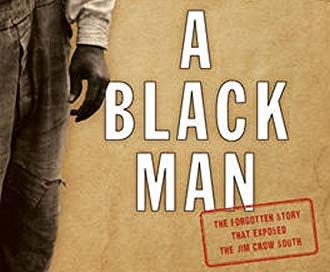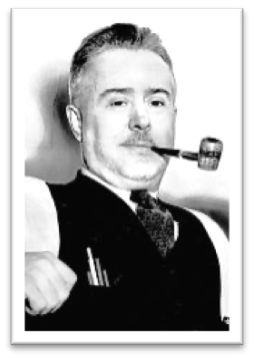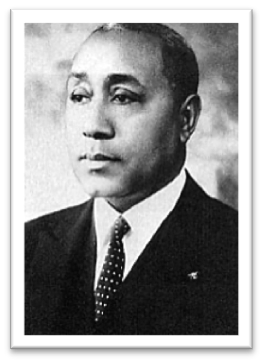'Undercover in the Land of Jim Crow,' the Series, Part 1
The story of the daring collaboration of newspaperman Ray Sprigle and Atlanta civil rights pioneer John Wesley Dobbs that exposed the awfulness of Jim Crow to the white North in 1948 needs to be told.
My history book ‘30 Days a Black Man’ retells the amazing but largely forgotten true story of a daring undercover journalism mission into the Jim Crow South in 1948 by a white star newspaperman from Pittsburgh named Ray Sprigle.
Sprigle, who pretended to be a light-skinned Negro, was hosted, guided, mentored and protected for a month by John Wesley Dobbs, a prominent black political and social leader from Atlanta.
Both men were brilliant. Both were in their 60s. Both were highly accomplished, nationally known and at the peak of their careers.
They traveled 3,000 miles of dusty and dangerous backroads together in Dobbs’ fancy car. They slept in the same bed and faced the same risks. They met black sharecroppers and the black elite from Savannah to the Delta.
By the time Sprigle returned to Pittsburgh he had seen enough to despise the white race. He was ashamed to be an American.
The powerful and passionate syndicated newspaper series he wrote about the legalized discrimination, oppression and humilation he saw firsthand shook up the country.
Reprinted here in full, it shocked the white North, angered the white South, pleased millions of blacks and sparked the first debate in the national mass media about the future of America’s cruel system of apartheid. Sprigle’s series also pleased Walter White, the boss of the NAACP, who greatly helped Sprigle.
‘30 Days a Black Man’ (Lyons Press, 2017) recounts Sprigle’s daring undercover mission and its impact on the country. Along with often shocking details of the daily awfulness endured by ten million blacks in the Jim Crow South, ‘30 Days’ depicts the trust, friendship and deep collaboration between Sprigle and Dobbs that made his pioneering journalism historic.
*****
From a nonfiction book to a film is always a rough ride, especially when Hollywood is doing the driving. Just getting Hollywood, or the streaming channels, to discover your book is almost impossible, even if you have a top agent like Susan Schulman, like I do.
Here’s my ‘elevator pitch’ for a limited series based on ‘30 Days a Black Man.’
Undercover in the Land of Jim Crow
In 1948 a white newspaperman from Pittsburgh disguises himself as a black man and goes undercover for a month in the Jim Crow South. What he sees makes him ashamed to be an American. What he writes wakes up the whole country. What he does with the help of the brilliant black leader from Atlanta who protected him from the KKK strikes an early blow against America’s apartheid. A true story.
30 Days a Black Man is packed with dramatic elements, great historical characters and events that often sound like they were drawn from today’s headlines.
It takes place in Pittsburgh, Atlanta, the Deep South and New York City in the pre-television era, when daily newspapers were king of the media and America was a strictly segregated land rife with racial inequality and discrimination.
1948 was a historic year.
It was the year President Truman ordered the integration of the armed services, the Dixiecrats walked out of the Democratic Party convention, the modern civil rights movement was being born and Jackie Robinson played his second season with the Dodgers.
It was also the year Sprigle and Dobbs risked their lives in the Deep South to expose its shameful system of apartheid to the entire country. Their partnership should have been put on film seven decades ago.
When the two great Americans get the Hollywood treatment they deserve, I hope that the screenwriters rely on many of the fact-based scenes I’ve included in my spec script.
Undercover in the Land of Jim Crow
Episode One
May 26, 1948
fade in ….
EXT. 1947 MERCURY, MISSISSIPPI DELTA, MOVING -- DAY
A dark green 1947 MERCURY EIGHT Town Sedan drives fast on
two-lane U.S. Highway 49W. The huge car passes vast flat
fields of cotton and a weathered "Colored Cafe."
Hundreds of black SHARECROPPERS, adults and children in
overalls and cotton dresses, are strung out in small columns.
They are using their hoes to chop away the weeds threatening
the baby cotton plants.
INT. 1947 MERCURY, MISSISSIPPI DELTA, MOVING -- DAY
TWO BLACK MEN ride in the front seat. The windows are down.
No AC. It's hot and humid. The driver is a large dark-brown
black man, JOHN WESLEY DOBBS, 66, of Atlanta.
Wearing a fancy 3-piece suit, no tie and white socks, he's
steering with his left hand, waving his right arm and
enthusiastically quoting a long passage from "Hamlet."
DOBBS To be, or not to be? That is the
question. Whether 'tis nobler in the mind to
suffer The slings and arrows of outrageous
fortune, Or to take arms against a sea of
troubles, And, by opposing, end them ... To die-
to sleep, -- Should I go on, Mr. Sprigle?
Dobbs' companion, RAY SPRIGLE, 61, is bald, wears heavy
black-framed glasses and weighs 210 pounds. A light-skinned
Negro from Pittsburgh with European features, he's not as
well dressed as Dobbs. A cheap newsboy's CAP is on his lap.
He's using a pen knife to put a point on a pencil.
SPRIGLE
Yes, please, Mr. Dobbs. DOBBS
Would you rather hear Markham's "The Man with the Hoe"? -- 'Bowed by the weight of centuries he
leans 'Upon his hoe and gazes on the ground,
The emptiness of ages in his face, 'And on his back the burden of the
world....'
SPRIGLE
No. No. It does me good to hear
Shakespeare. I was kicked out of
Ohio State long before we got to him.
DOBBS ... To die, to sleep,
No more; and by a sleep to say we end The heart-ache and the thousand
natural shocks That flesh is heir to: 'tis a
consummation Devoutly to be wish'd...
The horizonless scenery rolls by. A road sign on US 49W reads: Indianola 20.Sprigle reaches in the glove box and takes out a small notebook that sits on top of an old .32 COLT REVOLVER and a faded box of shells. With his pencil he scrawls "Except for telephone wires, could be 1860."
2.
INT. DINING ROOM, INDIANOLA, MS. -- NIGHT
SPRIGLE and DOBBS and two other black men, DR. VAUGHN and
WILLIE KIRKLAND, are in a nice middle class house. Standing
over an expensive dining room TABLE like military commanders,
they are looking at a ROAD MAP of the Mississippi Delta.
Dr. Vaughn is giving Dobbs tips on how to be safe in the
Delta, which white cotton plantation owners run like a feudal
kingdom filled with half a million black serfs.
DR. VAUGHN
You'll be suspicious in that new car.
A target. DOBBS
Our license plates won't help.
DR. VAUGHN
This isn't Atlanta.
DOBBS (SMILING)
I know that for sure, Doctor.
DR. VAUGHN
Don't talk to a white person.
WILLIE KIRKLAND
Don't talk to a sharecropper on the
road. Don't drive onto a plantation.
DR. VAUGHN
If a sheriff stops you, play dumb. Say
you're doing church work or selling
insurance. Don't even think the word
'NAACP.'
SPRIGLE (KIDDING)
It sounds like we're spies getting
ready to sneak into Nazi Germany.
WILLIE KIRKLAND
That's about right.
DOBBS
And we're the wrong color.
3.
EXT. 1947 MERCURY, MISSISSIPPI DELTA, MOVING -- DAY
A road sign on US Highway 82 reads "Greenville 23."The endless cotton fields are scattered with sharecroppers and their shacks. On a dirt road near the highway a WHITE FOREMAN, or "rider," with a pistol on his hip, sits casually on a horse and talks to TWO WHITE PLANTATION EMPLOYEES in a pickup truck.
FIVE SMALL BLACK SCHOOL KIDS walk single file along the dirt
road toward a school somewhere in the far distance. A yellow
SCHOOL BUS with WHITE KIDS on board passes the black kids,
raising a cloud of dust.
SPRIGLE
Buses for white children only?
DOBBS
Mississippi spends more each year carrying
white children to school than educating
Negro children.
SPRIGLE
Another crime of the 'Master Race.'
DOBBS
It's the way it is, Mister Sprigle.
It's Jim Crow.
Trailing half a mile behind Dobbs' car is a white 1946 FORD
COUPE with TWO WHITE MEN in their mid-30s in the front seat.
DOBBS (SMILING)
Hold on, my friend. Lunch is not far.
INT. SHERMAN'S RESTAURANT, GREENVILLE -- DAY
SPRIGLE and DOBBS are eating lunch in a black restaurant on
Nelson Street, the vibrant black commercial district of
downtown Greenville.
For sale by the cash register are the national editions of
the CHICAGO DEFENDER and the PITTSBURGH COURIER, the
country's two largest and most important black weekly
newspapers.
4.
DOBBS is reading Greenville's white daily paper -- the DELTA
DEMOCRAT-TIMES. The main headline on May 26, 1948 is "UN
effort to stop Palestine war fails." SPRIGLE is paging
through the national edition of the Pittsburgh Courier.
SPRIGLE
What's important news in Hodding Carter's
paper today?
DOBBS
The usual troubles of a troubled world ...
Other headlines on the crowded front page include stories on
a crisis in the Finnish cabinet, the rising price of cotton
and resumption of labor talks between Chrysler and striking
United Auto Workers.
DOBBS(CONT.)
Here's a story sure to please local
folks -- "Ambitious Civil Rights
Program Appears Bogged Down Until
After November Elections."
SPRIGLE
Hardly newsworthy.
DOBBS
... You ever meet the famous Mr. Carter?
SPRIGLE
I'd like to. He's a great newspaperman.
Time says he's "the liberal voice of
the New South."
DOBBS
He's Eleanor Roosevelt by the
Southland's shameful standards.
SPRIGLE (KIDDING)
Should we swing by and tell Mr. Carter
why we're snooping around his
backyard?
DOBBS (LAUGHS)
To you Northerners he looks like a
paragon of tolerance. But he's the
best friend Jim Crow's ever had.
5.
The waitress brings Sprigle a second piece of peanut butter
pie.
DOBBS (CONT.)
... and I hear he likes to shoot
Yankees who come down and stir up
trouble among us happy Negroes.
INT. GREENVILLE POST OFFICE -- DAY
DOBBS parks in front of the Greenville POST OFFICE.
Across the street and half a block behind his '47 MERCURY the
same white 1946 FORD COUPE from before with the TWO WHITE MEN
pulls in and parks. The car has GEORGIA license plates.
Sprigle enters the post office alone. One of the men from the
Ford follows him. Inside the post office are separate
partitioned lines for whites and blacks. SPRIGLE stands in
the black line. The white man stands in the white line.
Sprigle writes a Western Union TELEGRAM to the editor of the Pittsburgh Post-Gazette: "Alive and eating well in Greenville, Miss. -- Crawford."
As Sprigle leaves the post office, he passes by the white
guy, who steps out of line and follows him.
EXT. 1947 MERCURY, GREENVILLE MAIN STREET, MOVING -- DAY
SPRIGLE and DOBBS drive down Main Street. Everyone on the
sidewalks is white. They pass the 'whites-only' PUBLIC LIBRARY.
As they slowly pass the red brick OFFICES and busy printing
plant of the Delta Democrat-Times at Main and Walnut, Sprigle
looks over at the newspaper's building.
INT. DELTA DEMOCRAT TIMES OFFICE, GREENVILLE, MI. -- DAY
HODDING CARTER, 42, the dark and handsome editor and
publisher of the Delta-Democrat Times, sits in his cluttered,
book-lined corner office, banging away at his manual
typewriter.
On the wall is the FRAMED CERTIFICATE for the Pulitzer Prize
he won in 1946 for his racially tolerant editorials about
treatment of Japanese-American internees in Mississippi.
6.
On a shelf nearby are four copies of "Winds of Fear," his
novel about "the Negro problem" and his U.S. Army issue .45
AUTOMATIC. A SHOTGUN stands behind the door.
His wife BETTY enters with several handwritten LETTERS
stapled to their envelopes.
CARTER
Anything new?
BETTY
Just this.
CARTER
Let's hear it, honey.
Betty reads the typed but unsigned letter.
BETTY
"So you think dead nigger soldiers
belong on our town honor roll? You're
a traitor to the South and the white
race. After we cut your balls off,
they'll find you in the river."
CARTER
Let's see it ... At least he didn't
call me a 'nigger-loving communist'
... And it's nicely typed.
BETTY
That's what makes it so chilling.
CARTER
They're like the others. Cowards. All
talk.
Carter balls up the letter and throws it in the waste basket. Betty retrieves it, smooths it out and files it with dozens of others under 'Hate Mail.'
BETTY
Everyone in the Delta knows where we
work -- and live.
CARTER
If they come, I'm ready.
7.
BETTY
Hodding, you can't fight every Bilbo
and plantation owner in the state.
CARTER
I'm trying to save segregation for
them, not end it.
BETTY
They're too blind to ever see that.
CARTER
They'll be sorry when the goddamn
Yankees come down here with bayonets.
Behind Carter, outside his WINDOW, Dobbs' MERCURY drives past
as SPRIGLE looks at the building from his passenger window.
A few seconds later the white 1946 FORD COUPE with the TWO
WHITE MEN also drives past.






